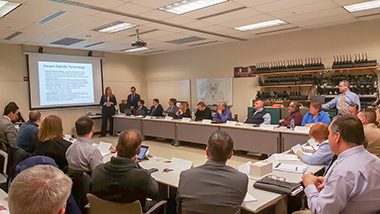Training New York’s First Responders
The National Center for Security and Preparedness Simulates Disaster to Save Lives
ALBANY, N.Y. (Nov. 27, 2018) – 10 years ago this month, a series of terrorist attacks targeted numerous sites in Mumbai, India, including a railway station, popular café, two hospitals and a theater. The attacks paralyzed the city for over three days. In all, at least 174 people were killed.
Experts at the National Center for Security and Preparedness (NCSP) wondered if New Yorkers were prepared for a similar attack.
Advanced Active Shooters Scenario
Now part of the College of Emergency Preparedness, Homeland Security and Cybersecurity (CEHC), the NCSP, which was founded in 2007, developed an “Advanced Active Shooters Scenario (A2S2): Tactics & Operations Course” based on lessons learned from Mumbai.
The 3-day scenario-based course has been delivered in partnership with the NYS Division of Homeland Security and Emergency Services (DHSES) at the State Preparedness Training Center (SPTC) since 2009. A2S2 prepares law enforcement, EMS and fire rescue for an integrated response to a complex coordinated attack.
Jayson Kratoville, the NCSP’s interim director, joined the Center and the A2S2 project in 2011, while studying for his MPA at the Rockefeller College of Public Affairs & Policy. Since then, the NCSP team has continued to keep the course current based on recent incidents like the Boston Marathon bombing and the San Bernardino attack.
The course’s scenarios are set in a fictitious city that is about the size of Rochester. NCSP mobilizes 60-plus subject-matter experts, instructors, and professional role players to simulate a multi-day incident. It includes a number of active shooters, vehicle ramming, and improvised explosive device (IED) attacks. The course also connects to a command workshop for senior leadership.
First responders must work together during the scenarios to save as many lives as possible.
“The attack in Mumbai had the whole city under siege. Understandably, it took officials a long time to get control of the situation,” Kratoville said. “There was a definite concern in the aftermath about what would happen if this type of coordinated attack happened here. Would we be prepared?”
“Our course is getting first responders to think differently about how they respond together. Because of the nature of their jobs, the role of each agency and discipline is ingrained in its culture. Our experts are working to help them adapt their mindset. The idea is to build a strong task force on-scene that can make quick, unified decisions during complex situations.”
Along with Kratoville, many of NCSP’s employees and student assistants are recruited from UAlbany, including Timothy Davis, who earned his master’s degree in international affairs from Rockefeller College last year and CEHC senior Ryan Denardo.
“We are taking classroom concepts and working with experts to apply them to real-world situations to give first responders the best training we can,” said Davis, a project coordinator at NCSP. “Unfortunately, there’s been some really horrific incidents as of late that reinforce the need to prepare for the worst. We need to make sure we are doing everything we can to save lives.”
“My father was in law enforcement and I want to help people in the same way that he has,” added Denardo, a training intern with NCSP. “You can really see the difference being made through the courses here. I’m glad to be part of them.”
 |
|
UAlbany campus leaders gathered for an emergency planning tabletop discussion in early November. (Photo: Paul Miller)
|
Emergency Planning on Campus
Though most courses are hosted at the State Preparedness Training Center, NCSP does offer its expertise elsewhere - including at UAlbany.
In early November, Kratoville, along with former NCSP director Samantha Phillips, teamed up with the University Police Department (UPD) to host an emergency planning tabletop discussion with campus leadership. The group went through a number of crisis scenarios that could impact campus.
In partnership with DHSES, NCSP leads more than 100 courses per year. The partnership has supported training for more than 30,000 emergency responders and homeland security professionals since 2013.
UPD offers active shooter training to all members of the UAlbany community. Those who are interested should contact Inspector Jennifer Baldwin at [email protected].
Photos: Patrick Dodson
![]() For more news, subscribe to UAlbany's RSS headline feeds
For more news, subscribe to UAlbany's RSS headline feeds
A comprehensive public research university, the University at Albany-SUNY offers more than 120 undergraduate majors and minors and 125 master's, doctoral and graduate certificate programs. UAlbany is a leader among all New York State colleges and universities in such diverse fields as atmospheric and environmental sciences, business, education, public health,health sciences, criminal justice, emergency preparedness, engineering and applied sciences, informatics, public administration, social welfare and sociology, taught by an extensive roster of faculty experts. It also offers expanded academic and research opportunities for students through an affiliation with Albany Law School. With a curriculum enhanced by 600 study-abroad opportunities, UAlbany launches great careers.


